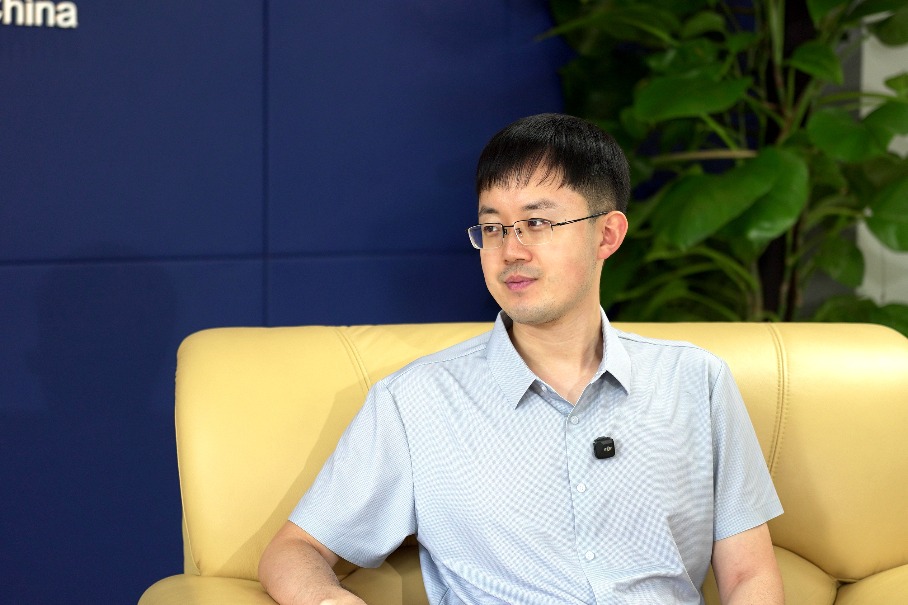Smart oversight


BRICS is a vital driving force in advancing the development of AI governance frameworks
The international political and economic landscape is undergoing rapid transformation, marking a new era of great development, change and adjustment. Notably, the BRICS countries, as representatives of emerging markets and large developing nations, have become a significant force on the global stage. Currently, the BRICS countries account for 45 percent of the world's population, cover approximately 35 percent of the global territory, and contribute around 35 percent to global GDP based on purchasing power parity.
The new generation of information technology, centered on artificial intelligence, is driving a new industrial revolution. According to International Data Corporation, by 2030, AI is projected to contribute around $19.9 trillion to global GDP, boosting global GDP growth by about 3.5 percent. The rapid development of AI is also causing structural changes in employment, with 23 percent of jobs expected to be transformed by 2027, and around 69 million new job opportunities created. AI is profoundly influencing the development trajectory of all human societies and reshaping the global economic landscape.
While the development of AI is having profound impacts, it also poses a series of unprecedented challenges, necessitating global cooperation to address them together.
For the BRICS countries, there are notable differences in their stages of development and industrial bases. As the largest developing country globally, China has made significant progress in AI technology and industry, boasting a group of internationally competitive AI companies and research institutions. While other BRICS countries are actively promoting AI development, their overall strength and technological level still need improvement. The developmental disparities among the BRICS member states are evident not only in technology development but also in the governance of AI.
The BRICS countries face the challenge of unifying the technical standards in global AI governance. Given AI's cross-border nature and widespread impact, establishing unified technical standards is crucial for ensuring interoperability and security. However, differences in technological levels and industrial development among the BRICS countries, coupled with limited influence in international standard-setting, make this task particularly difficult. This could lead to technical barriers but also hinder global AI technology exchange and cooperation.
The BRICS countries face challenges in their regulatory lag and enforcement capacity in AI governance. With the rapid development and widespread application of AI technology, regulatory measures often lag behind its practical use, making it difficult to effectively address potential security risks. Additionally, the BRICS countries face deficiencies in enforcement capacity and resources, which may result in ineffective regulation and even trigger a series of security and ethical issues.
Further, there are differences in values and cultural backgrounds among the BRICS countries. These differences can lead to inconsistent perceptions and stances on AI ethics, privacy protection, and data security, affecting the formation of a global consensus on AI governance. For instance, some countries may prioritize personal privacy and data protection, while others may focus more on technological development and application innovation. Such value-based disagreements can make it difficult for the BRICS countries to adopt a unified position on AI governance issues, increasing the complexity of cooperation.
There are also challenges in terms of international cooperation for the BRICS countries. Because of national interests and security concerns, there is weak AI cooperation among them. For example, since 2020, Chinese companies have faced increasing scrutiny from the Indian authorities. Relatedly, in 2020, the Indian government banned 59 mobile apps developed by Chinese companies, including TikTok, WeChat and UC Browser. In 2023, Indian authorities seized a total of 55.51 billion Indian rupees ($640 million) from Xiaomi.
The momentum of AI development is strong. The BRICS countries should strengthen their coordination and cooperation on AI to steadfastly advance global AI governance together.
In 2023, the Brazilian Academy of Sciences released ABC Lan?a Recomenda??es Sobre Inteligência Artificial No Brasil. In the same year, President Xi Jinping put forward the Global AI Governance Initiative. The above policies imply the BRICS members have generally reached a consensus and taken action on AI legislation, contributing BRICS wisdom and strength to the healthy growth of AI. The BRICS members should jointly discuss and formulate unified AI policies, establish a specialized legislative coordination body and hold regular meetings to discuss the objectives, priorities and progress of AI legislation. This will promote the development of global AI governance in a more unified direction.
To foster complementarity in technological strengths and resource sharing, the BRICS countries can jointly organize AI technology forums to promote technical exchanges and academic cooperation. The first meeting of the China-BRICS Artificial Intelligence Development and Cooperation Center marks a new starting point for collaboration in AI among the BRICS countries. The BRICS countries can also establish an AI technology sharing platform, promoting the sharing and application of technological achievements among themselves. For instance, the BRICS-led New Development Bank is also investing in AI applications in the BRICS countries, such as "smart metro development" in China. With the current expansion of the BRICS group, the potential for BRICS-led investments and cooperation will increase. Bilateral investment in AI among the BRICS countries, such as the $1 billion Russia-China Technology Investment Fund established in 2021, may increase as well.
The BRICS countries can jointly advocate for and promote the establishment of a global AI governance mechanism, develop international standards and norms for AI governance, and clarify the requirements and specifications for the R&D, application and management of AI technology. For instance, in 2023, the BRICS countries established an AI study group, recognizing AI as a distinct area of concern and committing resources to jointly mitigate risks and develop AI governance frameworks and standards. What's more, the BRICS countries can also drive the construction of a global AI regulatory system, strengthening the oversight and enforcement of AI technology to ensure its application aligns with laws, regulations and ethical standards, thereby promoting the healthy and orderly development of AI technology worldwide. For example, in 2024, Chinese researchers released the AI Governance International Evaluation Index, assessing the level of AI development, governance tools and effectiveness among the BRICS countries.
Talent cultivation and international cooperation in the field of AI are also being emphasized. First, China will implement the capacity-building program for BRICS digital education, establishing 10 overseas learning centers in the BRICS countries over the next five years, providing training opportunities for 1,000 educational administrators and faculty members. Second, Xiamen has launched China's first cross-border e-commerce air cargo line to BRICS cities, established the "China-BRICS Science and Innovation Incubation Park for the New Era", and formed a blockchain industry alliance among other BRICS cooperation demonstration projects. Furthermore, the BRICS countries should jointly initiate the "digital BRICS builders "program to support students in conducting research in AI, data science and cybersecurity. What's more, relying on BRICS partnership on the new industrial revolution, the BRICS PartNIR Innovation Center based in Xiamen keeps developing multilingual online and offline AI training programs to cultivate digital talents in the BRICS countries, which can be a good example for other BRICS countries. All in all, by strengthening talent cultivation and international cooperation, the BRICS countries will be able to continuously enhance their competitiveness and influence in the field of AI, contributing more wisdom and strength to global AI governance.
The BRICS countries are actively collaborating in emerging fields such as AI, accumulating successful experiences in AI application, interactive cooperation and governance under diverse national conditions. Through enhanced policy coordination, technical exchanges, resource sharing and talent cultivation, they aim to ensure the safe, efficient, reliable and controllable development of AI.
Jiang Qingquan is deputy director of the BRICS Economic Research Center at Xiamen University of Technology. Guo Xiaozhen is a researcher at this center. The authors contributed this article to China Watch, a think tank powered by China Daily. The views do not necessarily reflect those of China Daily.
Contact the editor at editor@chinawatch.cn.


































